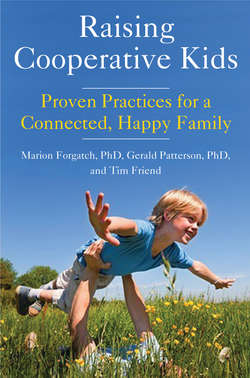Читать книгу Raising Cooperative Kids - Marion S. Forgatch - Страница 7
На сайте Литреса книга снята с продажи.
Introduction Cooperation Makes It Happen
ОглавлениеOne of the greatest gifts parents can bestow on their children is a happy childhood. As family research psychologists with our own blended family of five grown-up children, Jerry and I have shared a lifelong passion to understand what a “happy childhood” means and what it takes to raise “well-adjusted” children. The simple answer is—good parenting. But what is that?
After studying the good, the bad, and the ugly in relationships between thousands of parents and their children, we have found that the most important factor successful families have in common is a spirit of cooperation. The parenting techniques we have developed instill cooperation in children; they tap deep-rooted human instincts that are universal across cultural and economic lines. Whether you are rich, or poor, or middle-class; whether you live on a farm, in the suburbs, or in the city; whether you are black, brown, or white—the cooperative spirit is the same.
Our research reveals that cooperation is the keystone that makes the essential building blocks of children's behavior fall into place. Our parenting techniques, embraced so far by thousands of families, enable parents to teach their children new behaviors while promoting a home environment with few family conflicts. Cooperation, which parents must teach to their children, is the foundation of healthy child development.
Now, you may wonder: What do we mean by “cooperative children?”
Cooperative children pay attention; they follow rules, and work and play well with others. With siblings and peers, they share, take turns, and are good sports whether they win or lose. With adults—parents, teachers, and coaches—cooperative children willingly follow directions. Willingness is an essential distinction here. It's one thing when children behave out of fear of being punished. It's quite another when they want to follow your directions and get along with others rather than argue, refuse, and create conflicts. Cooperation, which most children are eager to learn, opens new dimensions of family life. It's the secret sauce that makes parenting a joy.
Cooperative children enjoy pleasing others without being so-called people pleasers. Following directions seems to come naturally to them most of the time. That cooperative spirit then generates harmonious teamwork that spreads throughout the family. We have conducted studies to learn what parents do to promote cooperation in their children. This book shares what we have learned from our research.
That research began about fifty years ago when Jerry read studies reporting that the traditional talk and play therapies he had so carefully learned to use did not change children's behavior. The traditional approach was to work directly with children while their parents sat patiently in the waiting room hoping that magic would take place. After these sessions, parents brought their children home knowing little about what had just transpired and knowing even less about what to do to follow up. Jerry decided to try something new.
A scientist to his core, Jerry began by watching how parents and children behave with each other. He visited the homes of families with well-adjusted children and families struggling with behavior problems. He sat quietly in the corners of their homes, observing their everyday lives, writing down what the parents did and how the children reacted, and how the parents reacted in turn. He wanted to understand why some children are cooperative and well-behaved while others are antagonistic and get into trouble. And he wanted to know the role that parents play in that interaction. I joined him in his studies in the 1970s, and together we have developed and tested a set of parenting techniques that help families change. We have seen that the parenting practices we describe in this book promote children's cooperation. In turn, that helps them get along better with siblings at home, follow parents' directions, learn routines and new behaviors, and do well in school and out in the community. Parents benefit by being less stressed and happier in their relationships at home and at work. A landmark study of single mothers who used our techniques found that they even became more successful financially.
This book draws from our decades of research into what parents can do to make things better—and what factors make things worse. We have formulated our parenting practices into simple strategies that are easy to follow. Each chapter presents at least one such strategy, and we have provided a list of them at the end of the book so you can easily refer to them. Make sure, as you apply them, that you include all the elements and follow them in the suggested sequence. Properly applied, these strategies promote a cooperative spirit in children.
